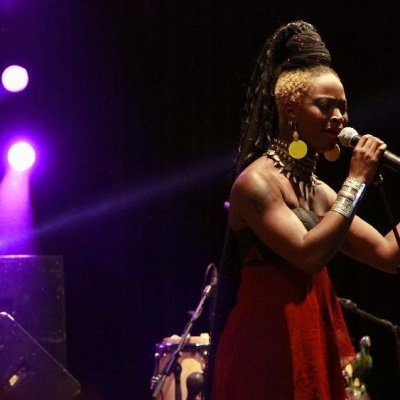
Dobet Gnahoré
Dobet Gnahoré, a singer, dancer and percussionist from the Ivory Coast, inherited the force of the “Bété“ tradition from her father, Boni Gnahoré, a master percussionist who plays with the Abidjan-based Ki-Yi Mbock Company, directed by Werewere Liking. It was within this Ivory Coast-based company that Dobet met French guitarist Colin Laroche de Féline, who went there to immerse himself in African melodies and rhythms, after being introduced to them by Toroma Sika in France. Having spent some time in the well-known Tché Tché dance company, Dobet decided with Colin (in 1999) to form a duo, Ano Neko, which means “Let’s create together“ in Bété language. The duo toured widely in France (1999-2000) where they settled temporarily following the instability that unfortunately struck the Ivory Coast. They also worked together on different projects (the creation with Ba Cissoko of “Le Cabaret Nomade“ and “L’Entre Deux Monde“). When they returned to Abidjan in 2001, they took part in MASA Off (festival) where they were the centre of attention and, while they were there, they recorded eight songs under the supervision of the late Marcellin Yacé, who was killed during the first day of rioting in the autumn of 2002. They then decided to come back to France, at least until peace and stability reigned in their beautiful country once again. In 2003, their artistic project refocused on Dobet Gnahoré and expanded when a backup vocalist and a percussionist joined them. This was when Contre Jour, which had taken Dobet’s destiny in hand, produced her first album entitled “Ano Neko“, making the link with Dobet and Colin’s story. This CD comprises songs recorded in Abidjan and others recorded in Belgium during the summer of 2003. From Mandingue melodies to Congolese rumba, from Ivory Coast Ziglibiti to Cameroon Bikoutsi, from Ghanian High-Life to Zulu choirs, their compositions, carried along with jazz-like sounds, are varied and colourful. The sanza, the balafon, the calebasse and bongos are brought in to support the guitar, the vocal backup and Dobet’s warm and powerful voice... Dobet sings in a range of African languages including Bété, Fon, Baoule, Lingala, Malinke, Mina or Bambara, thereby reproducing the Pan-African tradition of the Ki Yi Mbock group. On stage, her voice, her charisma and her huge presence, the result of several years theatrical and choreographic work, has great audience appeal.
